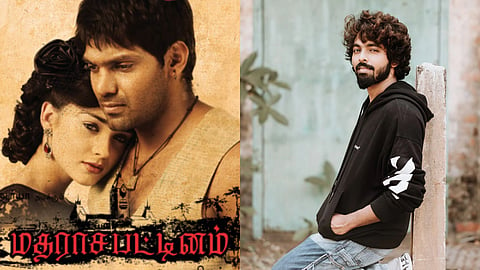

In Shakespeare’s Sonnet 55, he writes, "Not marble nor the gilded monuments of princes shall outlive this powerful rhyme," as he speaks of poetry's ability to defy time. That timeless idea, ahead of its era, extends naturally to music. Across centuries, songs have been instrumental in immortalising stories, artworks, and artists.
One such example is director Vijay's Madrasapattinam, whose music has helped the film continue to thrive in collective consciousness even 15 years since its release. The GV Prakash album, in many ways, has anchored the film’s emotional recall value over the years. Madrasapattinam was GV Prakash’s 15th film as a composer, and lyricist Na Muthukumar, who wrote the entire album, was closing in on his landmark 200th film.
Featuring five songs and two instrumental themes, the album is structured in a way that each piece evokes a particular emotion or plot point from the film. So much so, that the narrative can be reconstructed just by listening to the music, even without rewatching the film. As Madrasapattinam turns 15, here’s a look at how its music still resonates, and why it remains an enduring earworm.
‘Meghame O Meghame’ - Voices of Vannarapettai
As the film begins, Vijay's primary task is to establish pre-Independence Madras, with a focus on the dhobi community. GV Prakash uses the majestic yet emotionally stirring voice of legendary composer, the late MS Vishwanathan, to introduce us to the Vannarapettai community and its people. Soon enough, MSV is joined by actor Vikram’s voice that elevates the composition from being a mere introductory piece to one that brings these characters to our eyes. And as Na Muthukumar writes, “Anubavam paadam padichom adhanaal vaazhvil tholvi illai,” in the voice of MSV, the song shifts to a lighter tone with the “Oru magaani magaani, iru magaani araikka...” truly transcending us to simpler times. With veteran actor Nasser pitching in with his unique voice, GV Prakash employed three generations of singers with varying vocal ranges and tones to give us a song that summarises the naivety of the locals.
‘Vaama Duraiyamma’ - Culture with comic flair
Udit Narayanan lends his voice to this playful number featuring Arya’s Ilamparithi aka Parithi, who takes the Madras Governor's daughter Amy on a tour of erstwhile Madras. They are joined by a funny but acerbic Nambi (Cochin Haneefa), who plays the translator between Parithi and Amy. It is his English translations of Parithi's verses that elicit laughter, give us a glimpse into the Madras of the 40s, and also keep in check the rebellious nature of the locals. If lyrics such as “snake dance” and “elephant hands” crack us up, the tonal shift in the song’s end as Paruthi rightfully asks how the British have the heart to reign over such an indigenous land leaves a lump in our throats.
‘Pookal Pookum Tharunam’ - Raga of forbidden love
Relying upon Hindustani classical music’s popularly used Darbari Kannada, ‘Pookal Pookum Tharunam’ is a romantic melody for ages. The raga, traditionally sung in darbars or courts, is meant to exude royalty, a feeling GV Prakash wanted to convey while describing the blooming romance between a washerman and the daughter of the Madras Presidency Governor. Perhaps, Muthukumar’s “Yaarendru ariyaamal, perkooda theriyaamal... Ivalodu oru sontham uruvaanaathey,” perfectly describes the essence of this emotion. With Harini and Roop Kumar Rathod living as Amy and Parithi, the song makes us yearn for a love story like theirs, even if it is seemingly forbidden.
‘Aaruyire’ - Echoes of lost love
The underrated ‘Aaruyire’, is easily one of the most well-composed and designed compositions in the album. The picturesque Regency era sets are contrastingly juxtaposed with the pain and suffering that are the hallmark of the Carnatic raga Charukesi. Just like the ‘Uyire Uyire’ song from Bombay, ‘Aaruyire’ too tugs at the heartstrings, reminding you of the ill fate of the unfortunate couple. Lines like "Kondraalum azhiyaadha undhan gnyaabagam, Kanneeril mudindhaal thaan kaadhal kaaviyam…” trigger some kind of primal fear of losing a loved one, and emphasise the regret of not experiencing their warm embrace once again.
‘Kaatrile’ - Anthem of freedom’s flight
Placed in the climax of Madrasapattinam, GV Prakash seems to have had two tasks at hand — Make the audience feel the seriousness of the situation and instill patriotic fervour. Who better than Hariharan to hit two birds with one stone? As the couple run for their lives, with hope and love in their hearts, a version of Vande Mataram is inserted as the interlude to reiterate the need for freedom for both the country as well as the couple. Used more as a score than a full-fledged song in the film itself, the song acts as a reminder to embrace bravery in times of extreme uncertainty.
‘Feel Of Love’ - Theme of timeless yearning The film’s instrumental theme is a microcosm of Amy and Ilamparithi’s love story. It begins with simple piano notes, slowly swelling into a stringed guitar section, then a wind instrument, and finally culminates in a sweeping orchestral crescendo, followed by a vocal line that encapsulates the soul of the film. It’s no surprise the theme became a favourite ringtone for many, summarising an entire saga in just a few musical bars.